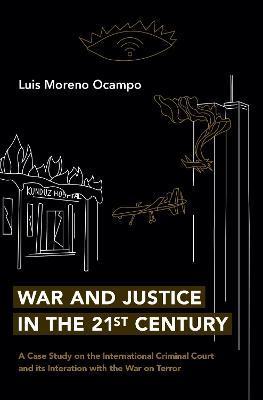War and Justice in the 21st Century: A Case Study on the International Criminal Court and Its Interaction with the War on Terror

War and Justice in the 21st Century: A Case Study on the International Criminal Court and Its Interaction with the War on Terror
This is the inside story of the International Criminal Court, one of the most innovative international institutions, from the unique perspective of its first Chief Prosecutor, Luis Moreno Ocampo. Moreno Ocampo received the unprecedented mandate to trigger the International Criminal Court's investigation into sovereign states in June 2003, just three months after the Iraq invasion. At the time, there were serious doubts about the ICC's viability. By 2012, the end of his tenure, the future of the ICC was no longer at risk. However, as Moreno Ocampo's experiences have shown, what was and still is up for debate is the Rome Statute's ability to "contribute to the prevention" of future crimes. The implementation of the Rome Statute has coincided with the War on Terror. The international criminal justice system that protects the rights of victims and suspects clashes with the US policy authorizing the killing abroad of individuals considered enemy combatants. Legal designs are literally a matter of life or death. This book examines a consequential blind spot: The War on Terror obstructed justice and promoted terrorism. The Iraq intervention produced the 'Islamic State', and after twenty years of occupation, the Taliban returned to power. The Afghanistan occupation has ended, but not so the War on Terror. Using drones and proxy forces to eliminate enemies in foreign countries has become the "new normal." Arguing that there is no chaos, just complexity, Moreno Ocampo produces an interdisciplinary analysis of his decisions, describing a "fragmented" international legal system's operation and the relationships between legal and political decisions. This book aims to help new generations to manage violence with new ways of legal and political thinking.
PRP: 383.29 Lei
Acesta este Prețul Recomandat de Producător. Prețul de vânzare al produsului este afișat mai jos.
344.96Lei
344.96Lei
383.29 LeiLivrare in 2-4 saptamani
Descrierea produsului
This is the inside story of the International Criminal Court, one of the most innovative international institutions, from the unique perspective of its first Chief Prosecutor, Luis Moreno Ocampo. Moreno Ocampo received the unprecedented mandate to trigger the International Criminal Court's investigation into sovereign states in June 2003, just three months after the Iraq invasion. At the time, there were serious doubts about the ICC's viability. By 2012, the end of his tenure, the future of the ICC was no longer at risk. However, as Moreno Ocampo's experiences have shown, what was and still is up for debate is the Rome Statute's ability to "contribute to the prevention" of future crimes. The implementation of the Rome Statute has coincided with the War on Terror. The international criminal justice system that protects the rights of victims and suspects clashes with the US policy authorizing the killing abroad of individuals considered enemy combatants. Legal designs are literally a matter of life or death. This book examines a consequential blind spot: The War on Terror obstructed justice and promoted terrorism. The Iraq intervention produced the 'Islamic State', and after twenty years of occupation, the Taliban returned to power. The Afghanistan occupation has ended, but not so the War on Terror. Using drones and proxy forces to eliminate enemies in foreign countries has become the "new normal." Arguing that there is no chaos, just complexity, Moreno Ocampo produces an interdisciplinary analysis of his decisions, describing a "fragmented" international legal system's operation and the relationships between legal and political decisions. This book aims to help new generations to manage violence with new ways of legal and political thinking.
Detaliile produsului











